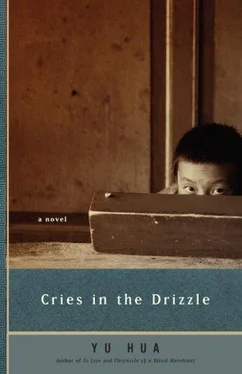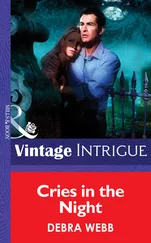The news of Sun Youyuan's impending death brought surprise and excitement to our normally torpid village. The old folks, who had regained a childish innocence after all their long years in the world, expressed an awed respect for Granddad's decision to die. His stance toward the bodhisattva gave them grounds to believe that he was most likely set on going home. According to one intriguing but far-fetched theory, at the time of his birth my grandfather had descended, like rain, from heaven; his foreknowledge of his own death proved that his assigned term in the dusty world had expired, and now he was returning to heaven, back to his true abode.
People of the younger generation, steeped in the atheism promoted by the Communist Party, viewed these ideas with scorn. Just as Sun Youyuan had been castigated by Sun Kwangtsai, these endearing seniors were flatly told that age had done nothing for them, that they were just getting more stupid all the time.
There I sat, in the middle of the room, the front door ajar, tapping out a monotonous rhythm. In the eyes of sundry spectators I was engaged in a ridiculous exercise. How did I feel about it? My fragile ego was hard put to keep shame and distress at bay, particularly with the village children pointing at me and giggling all the time.
All the commotion outside the house distracted Sun Youyuan as he made ready to depart this life, and a scene from his youth reappeared before him, the time he fled from a hail of Nationalist bullets. Agitated, unsure what was happening outside, he called Sun Kwangtsai. As my father entered the room, Sun Youyuan summoned the energy to sit up in bed, and he asked Sun Kwangtsai if somebody's house had caught fire.
When Granddad lay down in bed he had intended to die right away, but three days had passed and it seemed the longer he lay the more lively he felt. Even though Sun Youyuan yelled every dinnertime that his eating days were over, my mother still would wordlessly carry a bowl of rice in to him. Torn between an ideal death and all-too-real starvation, my grandfather hesitated agonizingly, but yielded in the end to hunger's authority. My mother always returned with an empty bowl.
Patience had never been Sun Kwangtsai's strong suit, and seeing my grandfather had not arrived at death's door as soon as he had expected, he lost confidence that he would die at all. When my mother, bowl in hand, prepared to enter Granddad's room and my grandfather repeated his old trick of insisting that he was on a fast, Sun Kwangtsai shoved my mother aside and yelled at him, “If you're going to die, don't eat! If you're going to eat, don't die!”
My mother found this rather shocking, and she whispered to Sun Kwangtsai, “That's going too far. The Lord will make you pay for that.”
But my father couldn't care less. He stormed off and could be heard saying to people nearby, “Did you ever hear of a dead man eating dinner?”
In fact, Granddad was not behaving as willfully as my father imagined. Sun Youyuan had the genuine sensation that his soul had flown, and he was firmly convinced that he was about to die. On the mental level he had already died, and he was simply waiting for his physical being to reach that same point of no return. Just as my father was growing more and more exasperated, Sun Youyuan himself was vexed that he was taking so long to die.
At this final stage of his life Sun Youyuan employed his scattered wits to ponder the question of why he had not yet expired. As the rice swayed in the sunlight, soon to be harvested, an herbal aroma was carried in by the southeasterly breezes. I don't know if Granddad smelled it or not, but a peculiar notion persuaded him that death's delayed arrival was in some way linked to those heavy ears of grain.
That morning Sun Youyuan again called loudly for Sun Kwangtsai. After venting so much rage, my father was now a bit despondent, and he walked listlessly into Granddad's room. Sun Youyuan told him in a conspiratorial whisper that his soul had not flown far away: it was still lingering in the vicinity, and that was why he had not died. (He said this so warily it was as though he feared his soul might overhear him.) The reason the soul had not flown far was that it was attracted by the scent of the rice field, and now his soul was mixed up with a flock of sparrows, the sparrows that were circling above the paddy at that very moment. Sun Youyuan asked my father to assemble some scarecrows and set them out in a circle around the house to frighten his soul away; otherwise his soul might reinhabit his body at any time. My grandfather opened his toothless mouth and said to Sun Kwangtsai with a mumble, “Son, if my soul returns, you'll be in the poorhouse again.”
My father was beside himself. “Dad, forget about dying! Just get back to living, will you? First it's a coffin you want, and now it's scarecrows. Give me a break, for heaven's sake!”
When the old men of the village heard about this latest development from Sun Kwangtsai (now in high dudgeon), they did not share my father's view that Sun Youyuan was making a fuss for nothing. My grandfather's belief that his soul was hovering about nearby struck them as perfectly plausible. At midday — I had stopped my tapping then — I saw several old men walking over with two scarecrows in their hands, their pious expressions in the sunlight conveying a curious dignity. They propped one of the scarecrows against the wall next to our front door and set the other one down outside Sun Youyuan's window. As they explained to Sun Kwangtsai later, they did this to smooth my grandfather's ascent to heaven.
My grandfathers allotted span was truly drawing to a close, and in the three days following his condition rapidly deteriorated. Once, when my father went into his room, Sun Youyuan could talk to him only in a faint tone, like the hum of a mosquito. By now he was no longer at the mercy of his appetite, for he had lost even the most basic desire for food and at most ate two or three mouthfuls of the rice my mother brought him. This led my father to loiter outside the house for quite some time, eyeing the scarecrows suspiciously and muttering to himself, “Can it be these things really work?”
My grandfather lay unwashed in that summer room for many days, and he wet his bed in the final stages when he was scarcely breathing. The storeroom reeked.
Once Sun Youyuan truly looked as though he was close to death, Sun Kwangtsai began to calm down. On two successive mornings he went to Granddads room to check on his condition, and when he emerged he was knitting his brows. Given to exaggeration as he was, my father asserted that Sun Youyuan had soiled a good half of the bed. He did not go into Granddad's room the following morning because, he said, he couldn't bear the stench. He told my mother to go in and see how Granddad was doing while he sat by the table and offered instruction to my brothers: “Your granddad will be dead soon.” He elaborated. “People are like weasels: when you try to catch them they let loose a stinky fart to make you all groggy, so they can escape. Your granddad is about to make his getaway, so it's horribly smelly in his room.”
When my mother came out of Granddad's room she was white as a sheet and was kneading the hem of her apron with both hands. She said to Sun Kwangtsai, “Quick, go and have a look!”
My father seemed to be launched off his stool. He scurried into Granddad s room and after a few moments he came back out again, with a rapt expression on his face. Dancing with joy, he said, “He's dead, all right! No doubt about it.”
In fact, Sun Youyuan was not yet dead; he was simply going in and out of shock. But my father, never very punctilious about small details, went off in a great rush to seek the help of people in the village, for it only now occurred to him that a hole had still to be dug. With a hoe over his shoulder and a mournful expression on his face, he went around the village calling people out of their houses, and then together with several locals he began to dig a resting place for Sun Youyuan next to Grandmother's grave.
Читать дальше












